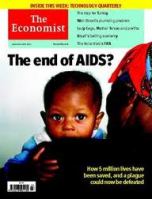
Maybe terrorism isn't the whole ball of wax?
Nice piece in WAPO about Ayman al-Zawahiri taking over al-Qaeda from the recently assassinated Osama bin Laden. Story leads with remembrances from a guy who knew him back in the day:
He was arrogant, angry and extreme in his ideas,” said Azzam, 40, son of a radical Palestinian ideologue who had become bin Laden’s mentor. “He fought with everyone, even those who agreed with him.”
Thus, experts are now saying that al-Qaeda will suffer under his leadership:
U.S. intelligence officials, terrorism experts and even the Egyptian’s former cohorts say a Zawahiri-led al-Qaeda will be far more discordant, dysfunctional and perhaps disloyal than it was under bin Laden.
Just to cover rear-ends, though, the story’s next statement leaves open the question whether or not the group will be more or less effective (terrorism experts must always do this to make sure they can win big when the next strike comes and they told us so!).
But honestly, why should anyone expect an organization rife with disharmony, disloyalty and dysfunction to perform better?
For a long time experts have told us that killing al-Qaeda’s top people may weaken the organization but also make it that much stronger by elevating the nastier, more battle-hardened generation. But organizations are organizations: when you pull the charismatic founder of the start-up, it usually flounders. And when you take out Uncle Junior Soprano, you get Tony. Talent is not elevated; it is diluted. The “new school” typically lacks the discipline of the “old school” and things fall apart. We may imagine, in our fears, that al-Qaeda is unique in this regard, but there’s little reason to believe so. Osama was the beloved figure, but Zawahiri is a “jerk” who proves the Peter Principle applies to terrorist groups.
I’m currently judging an “international grand strategy competition” for the online strategy community known as Wikistrat, where elite grad students and think tankers from around the world are playing a dozen key countries in a strategic planning exercise that extends a good two decades into the future. [Full disclosure: I serve as Wikistrat’s Chief Analyst.] One of our five key issue areas is the Salafist jihadist threat, but you’d be amazed at how little play that’s getting from the 30-plus teams as they generate grand strategic visions of the future. Instead, the competition so far is all about the jostling between rising and declining powers, with the terror threat portrayed mostly as a cost of doing national security business in this world. Actually, it’s food security that is eliciting the most creative responses.

Not so biblical anymore
The twentysomething contestants’ rather calm take on the whole terror dynamic reminds me of how AIDS first rose and then fell – thanks primarily to medical advances – as the almost biblical scourge of our globalized age. Now, it’s increasingly portrayed as a manageable lifetime condition. Humanity kept working toward acceptable answers and found them, plus we moved onto to climate change as our favorite environmental freak-out.
I tend to disagree with the notion implied in the WAPO article that, if al-Qaeda pulls off another big one, they’ll regain some sort of top billing again. We keep telling ourselves that, but the world seems to have moved on to even more compelling strategic issues – as has the next generation of strategic thinkers.
And I like that sense of balance.


